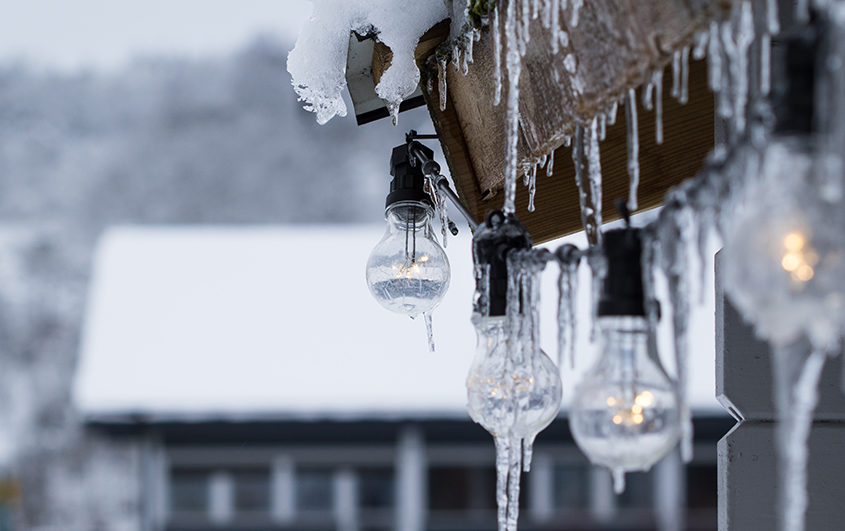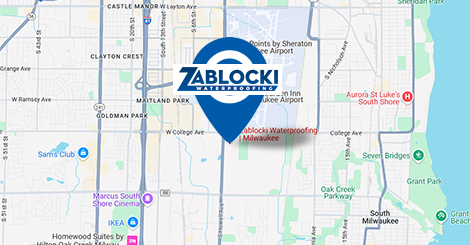For a homeowner, water is always the enemy. Humidity and rain in the warmer months of the year can be a constant source of stress, as homeowners work to prevent basement leaks, flooding, and mold issues caused by excessive moisture in or around a home’s foundation. By the time winter comes, homeowners may think they are in the clear. After all, what harm can snow possibly cause? The reality is that even though snow’s accumulation may appear to be of little significance to a home’s basement, it is actually as dangerous as summer humidity and spring rain. If you are a homeowner in Wisconsin, here are five reasons to protect your basement from winter leakage:
- Your Basement is Melting Surrounding Snow
In a Wisconsin winter, you may shudder at the idea of waking up from your warm bed and walking into the basement. However, after a few minutes out in the frigid winter weather and your basement seems just as warm and cozy as your bed. The point here is that your basement actually traps heat a lot better than you may think, and is almost definitely above the freezing point of water (32 degrees). As this radiant heat seeps through the walls of your basement, it can begin to melt snow that is up against the walls of your foundation, as well as frozen groundwater underneath. As this moisture accumulates with nowhere to go, it will inevitably begin to seep into and through tiny cracks in your basement walls, causing leaks to appear. - Hydrostatic Pressure is Building
Hydrostatic pressure is a fancy way of saying that gravity causes liquids to build pressure. This is why deep sea divers feel increasing pressure the deeper they dive. This force also acts as a catalyst for the melting snow caused by radiant basement heat mentioned above. As more and more snow melts, the pressure continues to build in the soil surrounding your basement walls and tiny leaks can therefore become more significant. This issue is compounded the deeper down the basement walls go. - Eaves and Downspouts aren’t Long Enough
Snow that accumulates in your gutters and isn’t covered by shade is typically the first to melt by the sun’s rays. This melting snow eventually travels down your downspouts and over your roof eaves. If your downspouts and eaves do not extend far enough away from your foundation, you are in for trouble. Ensure that your downspouts are extending at least six feet away from your foundation. Extending the roof eaves may be a more costly intervention, but it also may not be as necessary as long as your gutters remain properly cleaned and your downspouts drain at least 6 feet from your basement walls. - Improper Soil Type Around Your Foundation
All soil is not created equal. A heavy clay soil is composed of a high percentage of – you guessed it – clay! Clay is significantly more leak-resistant than your average topsoil, because clay soil has a much high potential for water absorption. This causes clay soil to expand, whereas more permeable types of soils allow water to pass, thus allowing hydrostatic pressure to build and create leaky basements.Before the first snowfall of the season, head to your local landscape and garden center and pick up enough clay soil to surround the perimeter of your home. Pack the soil against the walls of your foundation so that the soil slopes and pitches away from your home. The general rule of thumb is that when you lay your tape measure on the top of the soil up against your foundation, you should have 1” of clearance for every 12” away from your home. So, if you are three feet away from your home and lay a tape measure parallel to the ground on top of the soil, you should have at least 3” of ground clearance.
Once the clay soil is laid around your home and properly pitched away from your basement walls, you can add topsoil and grass on top for a cleaner look. Although water will seep through these top layers, the clay soil will still do its job, provided the pitch is adequate.
- Your Basement has Existing Cracks
This might seem like a no-brainer, but a basement can develop new cracks as the foundation settles over time. Make a monthly habit surveying your basement for signs of cracking, moisture, and other suspect attributes. Keeping a keen eye for trouble can help prevent a little problem from turning into a big problem.
At Zablocki Waterproofing, we help homeowners in Milwaukee, Waukesha, Menomonee Falls, Brookfield, and surrounding communities with expert basement waterproofing and foundation repair services. If you have noticed cracking, leakage, or other problems with your basement or foundation, don’t hesitate: give us a call today.






